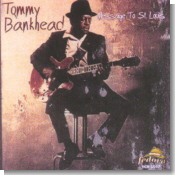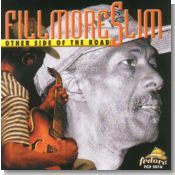
Tommy Bankhead
Message To St. Louis
Fedora Records
Arthur Williams
Ain't Goin' Down
Fedora Records
Fillmore Slim
Other Side Of The Road
Fedora Records
 One of the more surprising trends in the blues business the past
couple of years has been the insurgence of small, high quality independent record labels.
For most of the 1990s the best blues recordings were being issued by established companies
like Alligator, Black Top, Bullseye Blues, Blind Pig and Delmark. While the latter two
labels are still as strong as ever, Alligator and Bullseye seem to have slowed their pace
of new releases, and Black Top has dropped off the map altogether. Quite frankly, I think
that the best new stuff over the past two years has been issued by tiny newcomers like
Cannonball, Severn, Mocombo and Fedora. One of the more surprising trends in the blues business the past
couple of years has been the insurgence of small, high quality independent record labels.
For most of the 1990s the best blues recordings were being issued by established companies
like Alligator, Black Top, Bullseye Blues, Blind Pig and Delmark. While the latter two
labels are still as strong as ever, Alligator and Bullseye seem to have slowed their pace
of new releases, and Black Top has dropped off the map altogether. Quite frankly, I think
that the best new stuff over the past two years has been issued by tiny newcomers like
Cannonball, Severn, Mocombo and Fedora.
Fedora Records has specialized in recording older and lesser-known
artists, many of whom have not been recorded in a long time, if at all. These blues
veterans are teamed up with a strong group of backing musicians and given the room to
create their own sound. In every case, this formula has worked very well.
The best of the latest trio of Fedora releases comes from long-time St.
Louis guitarist Tommy Bankhead. Message To St. Louis is a very pleasant album,
and shows the 69-year-old Bankhead to still be a strong, but not flashy, guitarist. The
tight band is lead by excellent pianist Bob Lohr, who especially shines on the classic
tune "Going To Chicago."
Most of the songs on Message To St. Louis are Bankhead originals,
with the best being the catchy numbers "It Ain't Right" and "Who Said
It." Bankhead's best guitar work is heard on the title cut, a mid-tempo shuffle,
which also features nice sax playing from former Ike & Tina sideman Erskine Oglesby.
Message To St. Louis is tough, urban blues at its best, and is
highly recommended.
Harmonica player/singer Arthur Williams is another St. Louis legend, and Ain't
Goin' Down is his second release for Fedora. The Mississippi native is teamed up with
another former Jelly Roll King member, drummer Sam Carr, in addition to many of the same
backing musicians from the Bankhead disc.
Williams is a strong harp player, best heard on his own "Go On Little
Girl." He adapts his vocal style to the requirement of the song, sounding smoother on
covers like "Poison Ivy" and "Since I Met You Baby," then going raw
and raspy for the Howlin' Wolf-sounding original "Ain't Goin' Down." He then
turns around and gets funkier on the Louisiana swamp sound of "Slop The Hogs."
Ain't Goin' Down closes with Williams' version of the dirty
dozens, as he raps away on the unexpurgated "Arthur's Dozens." I've always heard
that St. Louis still had a strong blues scene. But after hearing these albums from
Bankhead and Williams, I need to plan a trip there soon to hear the new St. Louis blues.
 Fedora moves to the West Coast
for this third release, this one from the elusive Fillmore Slim. This man has recorded and
appeared under many different names in the past. I have a very good vinyl LP released
about 15 years ago by Clarence "Guitar" Sims, who I now know is one and the same
as Fillmore Slim. Other Side Of The Road is raw, down-home electric blues, with
eight of the 10 cuts being Sims originals. Fillmore Slim has a voice on the higher end of
the register, similar to, but much rougher than that of Chicago singer Jimmy Johnson. One
of my favorite numbers is the blues shuffle "Dial 911," which has a strong
guitar instrumental very reminiscent of Guitar Shorty's sound. Fedora moves to the West Coast
for this third release, this one from the elusive Fillmore Slim. This man has recorded and
appeared under many different names in the past. I have a very good vinyl LP released
about 15 years ago by Clarence "Guitar" Sims, who I now know is one and the same
as Fillmore Slim. Other Side Of The Road is raw, down-home electric blues, with
eight of the 10 cuts being Sims originals. Fillmore Slim has a voice on the higher end of
the register, similar to, but much rougher than that of Chicago singer Jimmy Johnson. One
of my favorite numbers is the blues shuffle "Dial 911," which has a strong
guitar instrumental very reminiscent of Guitar Shorty's sound.
Sims' New Orleans roots (he was born and raised in the Crescent City) show
on his version of "Blue Monday," a much funkier send-up featuring nice piano
from fellow Fedora recording artist J.J. Malone and rock-solid bass from Jeff Henry.
I've yet to hear anything I didn't like from Fedora Records, and all three
of these CDs make a nice addition to any serious blues fan's collection.
--- Bill Mitchell |


![]()